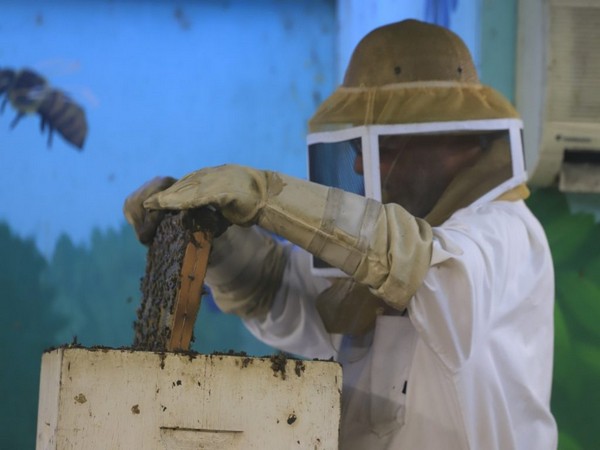Tel Aviv [Israel], July 29 (ANI/TPS): Israeli researchers uncovered a critical link explaining how a honeybee’s dietary balance directly influences its ability to nurse larvae and maintain colony health. The findings are expected to inform scientists working to reverse their declining population.
Bees are primary pollinators for many plants, including a large variety of crops, and an estimated one-third of all food consumed by humans. However, their population has been declining because of pesticides, loss of habitats, pollution, and climate change, among other factors.
“Balanced nutrition is fundamental for honeybee colonies, impacting not just individual health but also the overall efficiency and survival of the hive,” said Hebrew University Professor Sharoni Shafir, who led a team of researchers whose findings were recently published in the peer-reviewed Animal Behaviour. “Our study underscores the importance of maintaining a balanced omega-6:3 ratio in the diet of honey bees to ensure they can perform their crucial roles within the colony effectively.”
Honeybees rely heavily on a balanced diet to sustain their health and efficiency. The Hebrew University study revealed that an unbalanced diet, specifically one with a high omega-6 to omega-3 ratio (5:1), significantly hampered the bees’ ability to nurse larvae. The imbalanced diet specifically delayed the onset of nursing, reduced nursing frequency, and disrupted the care given to larvae.
These findings are particularly alarming in cultivated landscapes where nutritionally balanced pollen sources are often scarce, the researchers said.
To investigate these effects, the team conducted an experiment where one-day-old adult worker bees were fed either a balanced diet or an unbalanced diet for seven days.
The bees were then tagged with barcodes, released into a common-garden hive, and continuously filmed for six days. The results were striking: bees on the unbalanced diet showed delayed nursing behaviour and decreased efficiency in differentiating between larvae of different ages, particularly three-day-old and four-day-old larvae.
The implications of this research extend beyond individual bee health, the researchers stressed. In landscapes dominated by cultivation, the availability of balanced pollen is often limited, leading to a higher omega-6:3 ratio in bee diets. This nutritional imbalance could threaten bee populations by affecting their cognitive abilities and overall colony sustainability. Shafir emphasized the need for conservation efforts to ensure that diverse and nutritionally adequate pollen sources are available for these essential pollinators.
“This study opens new avenues for further research linking fitness-related behaviours to nutritional balancing in honeybees,” Shafir said. “It also highlights the need for increased awareness and measures to support the nutritional needs of honeybees, essential for maintaining their populations and the vital pollination services they provide.” (ANI/TPS)
Disclaimer: This story is auto-generated from a syndicated feed of ANI; only the image & headline may have been reworked by News Services Division of World News Network Inc Ltd and Palghar News and Pune News and World News
HINDI, MARATHI, GUJARATI, TAMIL, TELUGU, BENGALI, KANNADA, ORIYA, PUNJABI, URDU, MALAYALAM
For more details and packages
















